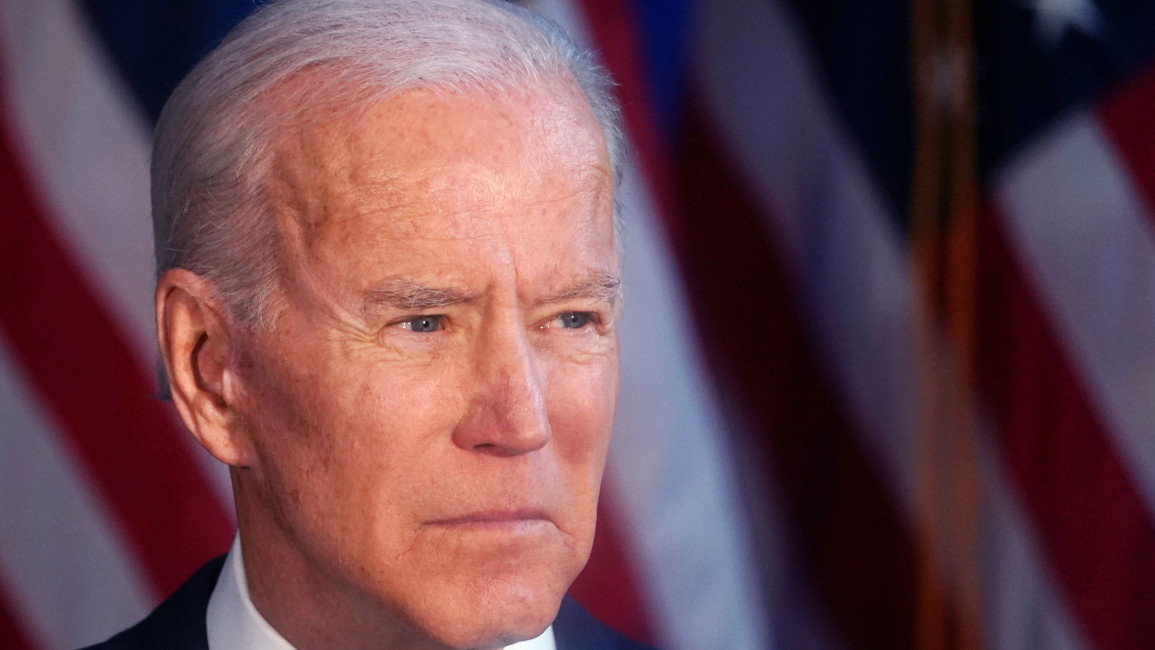'We’ll save democracy': Biden focuses on Ukraine in State of the Union address
US President Joe Biden vowed on Tuesday evening to "save democracy" as he gave his first State of the Union address, which mainly focused on Russia's devastating invasion of Ukraine.
Addressing a room full of Congress members, many of them wearing Ukrainian flags on their lapels, Biden praised the Ukrainian people and their leader, President Volodymyr Zelensky.
He listed the ways in which the US is supporting Ukraine, diplomatically, politically, and economically, in its fight against the Russian invasion.
"When the history of this era is written, Putin's war on Ukraine will have left Russia weaker and the rest of the world stronger. While it shouldn't have taken something so terrible for people around the world to see what's at stake, now everyone sees it clearly," Biden said.
He then went on to discuss domestic issues such as inflation, the pandemic, unemployment, infrastructure, and prescription drug prices, and his plans to address them through his policy agendas.
He also urged his audience of Congress members to support voting rights legislation and women's reproductive rights.
For Biden, whose approval rating is at a dismal sub-40 percentage point, this international crisis could very well give him the popularity boost he needs.
"My suspicion is that Ukraine has sort of sucked the oxygen out of any impact the speech might have. Events are moving quickly. It's totally dominating the airspace," Gordon Adams, a professor of US foreign policy at American University, told The New Arab.
"There's unity in NATO right now, and that can't do anything but help Biden," he said. "This is his reputation. He's Mister Foreign Policy. The links across the Atlantic are the strongest he's ever had. The Biden administration has creatively used this to create unity. He can tick this off as a foreign policy win so far."
But if history is any indication, this potential boost in popularity will likely be short-lived. Adams points out that back in the early 1990s, when the US-led invasion of Iraq following its occupation of Kuwait, George H.W. Bush's popularity shot up. The following year, he lost re-election to Bill Clinton.
"We will save democracy," said Biden, as he wrapped up his speech, giving double meaning to his determination to pass voting rights reform in the US, as well as Ukraine's existential struggle against an unprovoked invasion.
It was followed by a speech by the Ukrainian ambassador to the United States, Oksana Markarova on her country's crisis, which drew a standing ovation.
Though Biden's speech had stirring moments, particularly with reference to Ukraine, it is important to remember that few Americans are generally swayed by presidential speeches.
"You have to accept the fact that this is a speech by an American president whose poll numbers are below 40 percent," Aaron David Miller, a senior fellow with the Carnegie Endowment for International Peace who focuses on US foreign policy, told The New Arab.
"Most Americans that he wants to reach won't be tuning in. Most Americans aren't focused on Ukraine. Most are focused on pocketbook issues."

![Trump's warm greeting to Netanyahu contrasted with Kamala Harris's critical reception [Getty]](/sites/default/files/styles/image_212x120/public/2024-07/GettyImages-2162908988.jpg?h=69f2b9d0&itok=uRh_9WXh)
![The brutal assault on Khan Younis has killed dozens and displaced thousands more [Getty]](/sites/default/files/styles/image_330x185/public/2024-07/GettyImages-2162526709.jpg?h=d3eda8cf&itok=n5N-o8p5)
![Members of the Algerian delegation threw roses into the Seine [Getty]](/sites/default/files/styles/image_330x185/public/2024-07/GettyImages-2162980872.jpg?h=199d8c1f&itok=h_3o_TOL)